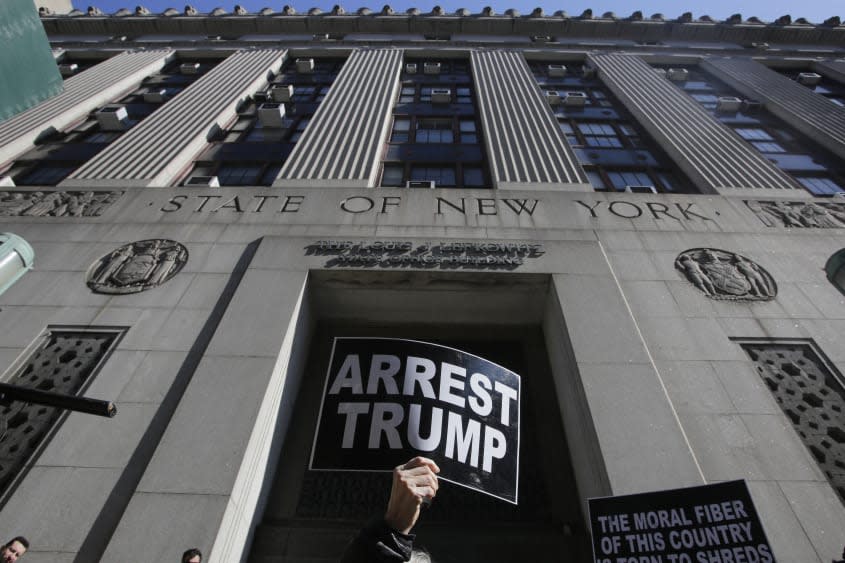Donald Trump's extradition dilemma

- Oops!Something went wrong.Please try again later.
- Oops!Something went wrong.Please try again later.
Near the close of his time in office, former President Donald Trump announced that following his time at the White House, he and his family would uproot themselves from the city and state that made him famous and move their permanent residence from New York to Palm Beach, Florida.
"I hated having to make this decision," Trump wrote in a series of characteristically dramatic tweets. "In the end it will be best for all concerned."
Now, almost four years later, Manhattan prosecutors seem prepared to bring criminal charges against the former president over his alleged hush-money payments to adult film star Stormy Daniels. For legal reasons, Trump's decision to eschew his eponymous Midtown skyscraper for his sprawling Mar-a-Lago estate has been infused with a renewed sense of both significance and urgency.
What's the issue?
If a Manhattan grand jury recommends District Attorney Alvin Bragg bring charges against Trump, the former president has essentially two choices: turn himself in to authorities in New York City, or stay at Mar-a-Lago to await eventual extradition back to New York. If he takes the first option — as his attorney Joe Tacopina suggested during a recent podcast interview — the criminal proceedings would move ahead (relatively) smoothly. If he opts to remain in Florida, a growing chorus of MAGA supporters have begun demanding Gov. Ron DeSantis (R) quash any extradition request and effectively enact a "sanctuary state" around Trump.
"Ron DeSantis should be standing in the breach to stop any sort of extradition of Trump from the state of Florida," Republican congressman and fellow Floridian Matt Gaetz proclaimed in a News Nation interview. "The fact that he's not doing so puts every Floridian at risk."
It's a sentiment shared to varying degrees of extremity by other Trump-aligned conservative figures.
Can DeSantis even do that?
Not really. The legal basis for the theory that DeSantis can block an extradition request by Manhattan prosecutors rests on "an obscure provision of Florida law that allows the governor, upon receiving an extradition request from another state, to investigate 'whether the person ought to be surrendered,'" University of Texas School of Law professor Steve Vladeck explained to MSNBC. The problem is that the provision in question is largely a matter of administrative formality.
"The governor doesn't have the power to stop an extradition," Florida-based attorney and legal commentator Tamara Holder told Insider. "The governor's only involvement is to look at the papers and make sure that the papers are proper to issue the warrant." While DeSantis could ostensibly delay that process by calling for various reviews to ensure everything is in order, he would then have a 60-day deadline to ultimately sign the request.
Even if DeSantis did succeed in temporarily derailing the request, there is a mountain of legal precedent guaranteeing that Trump would have to be extradited back to Manhattan eventually. As Vladeck noted, there's the Extradition Clause in Article IV of the Constitution, which has since been buttressed by the 1793 Extradition Act, and more recently, the 1997 unanimous Supreme Court ruling in New Mexico ex rel. Ortiz v. Reed, which rejected New Mexico's attempt to block an extradition request from Ohio.
It would be "unprecedented" for DeSantis to attempt to fully block an extradition request for Trump, Ambrosio Rodriguez, a Los Angeles criminal defense attorney and former prosecutor at California's Riverside County District Attorney's Office, told Newsweek. Even the mechanics of such an attempt would be wholly lacking, with DeSantis' authority extending only to state police. "The issuance and enforcement of the warrant happen in a court of law, and in this case, local police in Florida could easily carry out the arrest of Trump without any involvement by state troopers," Rodriguez added.
Trump's legal team, meanwhile, has reportedly been working on scenarios in which the former president would negotiate an "agreed-upon surrender date and a remote initial appearance when they are notified of charges," rather than a high-profile in-person appearance that plays to Trump's sense of drama.
For his part, DeSantis — widely considered Trump's top challenger should he enter the 2024 GOP primary race — rejected calls to involve himself in the extradition process beyond his routine role, explaining during a press conference that "we are not involved in this, won't be involved in this."
You may also like
Why is Ron DeSantis slipping in the polls?
Essential molecules for life may have been 'delivered' to Earth from space
U.S. housing prices fall for 1st time since 2012, but monthly sales rise after 12-month slide

